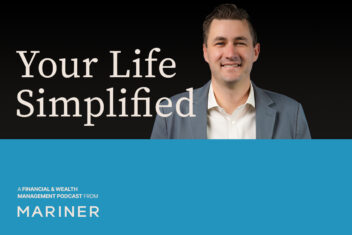Your Questions, Answered: Investment Property Income
On this week’s episode of Your Questions, Answered Mike McAndrews and Brian Leitner discuss replacing investment property income, and answer the following question:
“I’m looking to replace the income I received from an investment property. Suggestions on how to do that?”
Do you have questions you’d like answered? Email them to [email protected], and we’ll provide answers.
Transcript:
Brian Leitner: You have questions. We have answers back with another quick clip. So we have another question and I appreciate you joining the show today. And this question comes in, someone’s asking, they’re looking to replace income that they were receiving from an investment property, that had generated income for them. And they’re trying to find the time to replace that income, any thoughts on how to do that? Or suggestions if someone were to meet with you?
Mike McAndrews: Oh goodness. That’s a loaded question. There’s a lot of moving parts with replacing, investment real estate. And I think the first thing that comes to mind is that this underscores why you want to have a team of advisors in place because while coming to your wealth advisor is a great place to help start to resolve these issues. something like, selling real estate and replacing the income is going to require you. Okay. We need to work closely with your CPA. There’s going to be need for an attorney. And there may be other players that have to come in place, but that’s the first thing it brings to mind is, this is an involved situation and you’ve got to have the right team in place, to take advantage of that. So that’s where I’d start with, just because so many issues that you’re going to have to consider and address. What kind of income do I need to replace? And so, how could I do that? Do you want to be involved in the management of, any kind of replacement, investment going forward, and obviously what are tax implications of making a change now? So there’s a lot, and it underscores the need of why you want to have a well-rounded team that covers many disciplines.
Brian: So if some of them were coming to you to your office today with a question such as this, where do you start that process? What does that look like? I understand you need a team of advisors and maybe that’s the first step, but can you share a little bit of line around that process?
Mike: Well, like anything we’re going to have a conversation just like you and I are having where we’re going to try to uncover more facts. So think of it. I’m going to be a journalist, and I’m going to interview you about what do you want to accomplish with this change? So, you know, let’s create an example and say, I asked you a number of questions and you say, I no longer want to be involved in management. I’ve held this for a long time. And so the values appreciated a lot, which, creates a potential tax impact. We often find that the biggest driver in the decision path that a client will go is how much tax am I going to have to pay? So, we’re going to take them down that path of asking, what’s important to you in making this transition. That’s going to allow us then to, with the team of advisors, craft solutions that best meets your, your specific situation.
Brian: Any vehicles or strategies that you generally might utilize in events, this, the sale of real estate. There are a lot of things, vehicles that you can use that are out there.
Mike: So if we were in that situation and the client said, I don’t want to be involved. I want to minimize the amount of tax on her pay. There are two things that come in mind. One is, you have the ability to make a tax-free exchange. The IRS allows you to do that. You move from one investment real estate property to another, and it’s an involved process. Some would say it’s complicated. I’d just say, there’s a lot of steps and you’ve got to be careful to follow them closely. But you have an option of making a tax-free exchange. You may hear it called a 1031 exchange, but it’s really just moving from one property to the other. And I’m moving my cost basis from one to the other. That’s it. I don’t have to pay taxes at the end of it. There are some rules about how you go through it, but that’s it. Now the other vehicle that comes to mind is, okay, I’ve got to have a property to put this into, and, you already told me I don’t want to be involved in managing it because I don’t want to spend my time there anymore. Well, we need to look for an investment that’s going to allow you to participate passively. And, there are some fantastic, investment products out there that allow us to do that. not really a mutual fund or an ETF, but it’s a similar vehicle to that, but it’s specific to this exchange process and is specific to real estate. And it would allow you to replace your income, preserve your tax status and not be involved with it. I mean, it’s really just a function. We’ve got to find the right strategy for that client.
Brian: All great points. Mike, I appreciate it. It’s a, to your point, there’s a lot of moving parts. It all starts with the plan. Ultimately the income that this individual was trying to replace the tax consequences on what’s going on with the rest of their financial situation for any given year, and then ultimately, what do you want to do with that asset? Is it really time to part ways? Or am I just going to roll it into a different asset and take that tax can down the road and who knows what interest rates might be? So everyone’s situation is a little bit different, but Mike, thanks again for coming on the show and answering this question.
Mike: I appreciate it. My pleasure again, Brian, thanks for having me.
Brian: And if you have questions and you want to email them to us, please feel free to go ahead and email at [email protected]. Thanks for watching.

